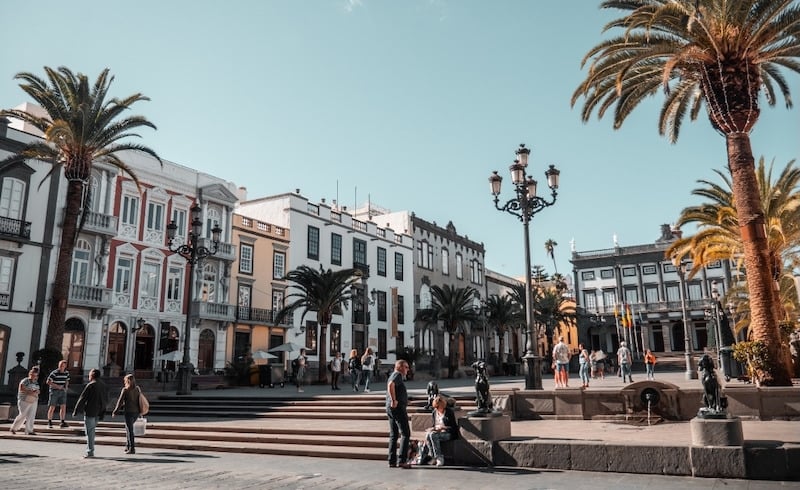Next to English and Mandarin, Spanish has long been recognised as one of the top widely spoken languages in the world. In 2020, it even ranked second among the most studied languages on Duolingo! That said, it’s good to learn some Spanish phrases and expressions especially when you often travel outside Asia. Be it Spain, Peru, Argentina, or any other country where it’s the official language, knowing the basics would certainly make your trip more convenient (if not fully smooth-sailing).
And if you need more reasons to start memorising basic Spanish phrases, here’s another fact: Spain is one of the best countries you can easily migrate to! Not really into moving completely and would rather try living temporarily in different places? Well then, it might interest you that it’s among the countries that offer long-term visas for digital nomads — along with Mexico and Costa Rica. Pretty cool, if you’d ask us!
So, shall we begin?
Also read: 10 Reasons Why You Should Learn The Local Language Before A Trip
Basic Spanish greetings to remember
1. Hola
This is probably the most well-known of all Spanish words (even among non-native speakers), which means ‘hello.’ And more often than not, you’re bound to hear this from different people throughout your trip!
Proper pronunciation: O-la
2. Buenos días
Starting your tour first thing in the morning, or simply going out for breakfast? Best to greet people, especially hotel staff and restaurant servers, with a cheery ‘good morning.’
Proper pronunciation: Bwe-nohs dee-ahs
3. Buenas tardes
Once noon kicks in, make sure to switch your greeting to this Spanish phrase for ‘good afternoon.’ Some native speakers tend to use this even well after sundown — making it an alternative for ‘good evening’ in some cultures. Although, if you want to err on the side of caution…
Proper pronunciation: Bwe-nahs tahr-dehs
4. Buenas noches
This one is Spanish for ‘good evening’ and ‘good night.’ Yes, it goes either way!
Proper pronunciation: Bwe-nahs no-chehs
5. ¿Cómo está? / ¿Cómo estás?
When meeting someone for the first time, make sure to say ¿Cómo está? since this is the formal version for ‘How are you?’ Meanwhile, ¿Cómo estás? is informal and better suited for when it’s someone you already know.
Proper pronunciation: Koh-moh ehs-tah / koh-moh ehs-tahs
6. Bien, gracias
This is the standard polite answer when someone asks how you are doing. It means ‘I’m good, thank you.’
Proper pronunciation: Bee-yen gra-thee-as or Bee-yen gra-see-as
7. Así así
This is another way to respond to ‘how are you?’ albeit in a more casual context, or if you’d rather be somewhat more honest. This translates to ‘just okay,’ ‘so so,’ or essentially, ‘neither particularly good nor particularly bad.’
Proper pronunciation: A’si a’si
8. Mucho gusto / Encantado
These are the most commonly used Spanish phrases for when you’re meeting someone for the first time. In a nutshell, mucho gusto translates to ‘Nice to meet you,’ while encantado means ‘charmed’ or ‘delighted’ (if you wanna sound rather fancy). Oh, and fret not — these could apply to any gender!
Proper pronunciation: Moo-cho goos-toh / eng-kahn-tah-doh
9. Igual
This is how you can respond if you hear someone say the Spanish line from the previous item to you. It directly translates to ‘likewise.’
Proper pronunciation: Ee-gwal
Other common Spanish phrases for everyday

10. ¿Habla Inglés?
Only know the most basic Spanish phrases and not confident with having a full-blown conversation with a local? Well, it definitely wouldn’t hurt to ask, ‘Do you speak English?’ first.
Proper pronunciation: Ah-bla eeng-glehs
11. Lo siento, no hablo Español
This will come in handy if you get mistaken for a local or even an expat who can speak enough Spanish. Simply put, it’s used to convey, ‘I’m sorry, I don’t speak Spanish.’
Proper pronunciation: Loh syehn-toh, noh ah-blo Es-pah-nyohl
12. ¿Cómo se dice… en Español?
You can say this when you don’t know how to translate an English word or phrase to Spanish. For instance, you can say ‘¿Como se dice train station en Español?’ to ask ‘How do you say train station in Spanish?’.
Proper pronunciation: Koh-moh seh dee-seh… en Es-pah-nyohl
13. Por favor
Now you know how to say that magic word that is ‘please’ in Spanish.
Proper pronunciation: Por fah-bor
14. Gracias
Of course, there’s also the other universal magic word: ‘Thank you.’
Proper pronunciation: Gra-thee-as or Gra-see-as
15. De nada
As many of you probably know even before, this is means ‘You’re welcome.’
16. ¿Qué hora es?
This is the easiest way to ask, ‘What time is it?’ in Spanish.
Proper pronunciation: Keh o-rah ehs
17. Sí / Quizás
These two are the Spanish phrases for ‘yes’ and ‘maybe’ respectively. And in case you were wondering what ‘no’ in Spanish is — well, it’s actually just that.
Proper pronunciation: See / Kee-thahs or Kee-sahs
18. ¿Por qué?
Let’s say you get asked a question and you’d like to have further context, you can always ask ‘Why?’ in Spanish.
Proper pronunciation: Por keh
19. Perdón / Con permiso
There are two basic Spanish phrases for ‘Excuse me’, depending on the situation. The former is for when you accidentally bumped someone, but don’t want to come off as rude. Meanwhile, the latter could also translate to ‘If you’ll excuse me’ — i.e., when you’re about to pass through and you’re giving forewarning to someone about that.
Proper pronunciation: Pehr-don / Kon pehr-mee-soh
Essential Spanish verb phrases to keep in mind
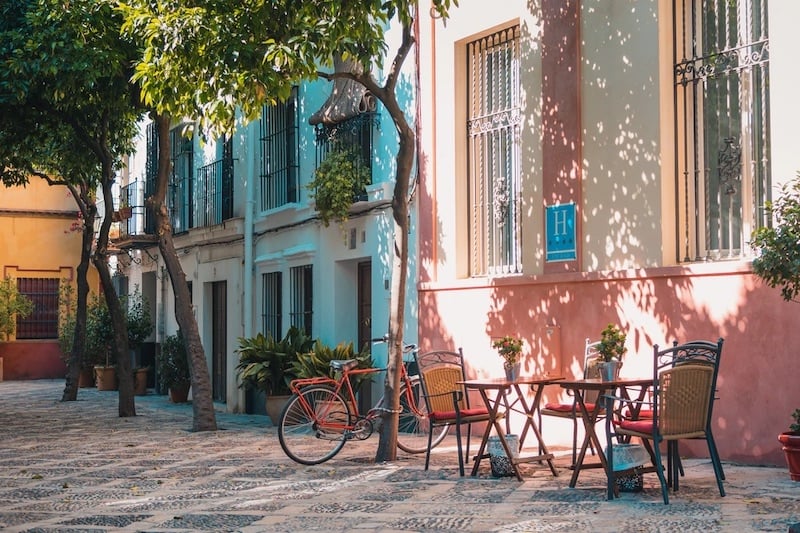
Image credit: Johan Mouchet
20. ¿Tienes…?
Here is a simple way to ask someone, ‘Do you have…?’ in regard to a particular object. Say, when you’d like to ask for a pen to borrow, you can say: ¿Tienes un bolígrafo?
Proper pronunciation: Tyeh-nehs
21. Tengo… / No tengo…
While the previous item is a question, these Spanish phrases are the appropriate way to start your answer. Basically, these mean ‘I have…’ and ‘I don’t have…’ respectively. So, for instance, if you’re on the receiving end of the sample question above, you can either say: Tengo un bolígrafo or No tengo un bolígrafo.
Proper pronunciation: Tehng-goh / Noh tehng-goh
22. Necesito…
Meanwhile, this one means ‘I need…’ then combine it with a particular object. For example, when going into a restaurant (more on that later) and you need a table for three, you can say: Necesito una mesa para tres.
Proper pronunciation: Neh-theh-see-toh or Neh-seh-see-toh
23. Me gustaría…
On the more courteous-sounding side, you can opt for this Spanish verb phrase that means, ‘I would like…’ So, going back to the previous example, you can also go with: Me gustaría una mesa para tres.
Proper pronunciation: Meh goos-tah-ree-ah
24. Busco…
This one is the Spanish translation for ‘I’m looking for…” It’s a good thing that it’s fairly easy to remember, given that it will definitely come in handy for situations like looking for a hotel. In this case, you can say: Busco un hotel.
Proper pronunciation: Boos-koh
Spanish phrases for directions and all things travel-related
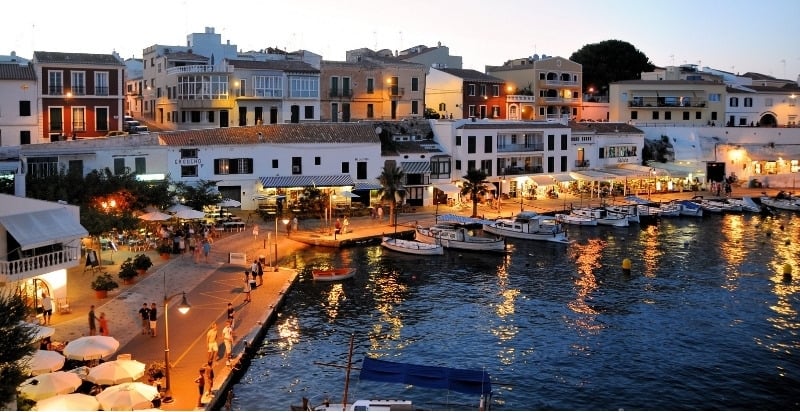
25. ¿Dónde está el baño?
Essentially, ¿Dónde está…? translates to ‘Where is…?’ This one specifically means ‘Where is the bathroom?’ Trust us, it’s one of the Spanish phrases worth keeping in mind for when you’re exploring the city.
Proper pronunciation: Don-deh ehs-stah el bah-nyoh
26. ¿Dónde esta el cambio de moneda?
Here’s another Spanish phrase that’ll come in handy. It means ‘Where is the money exchange?’ for when you need to have more moolah converted to the local currency.
Proper pronunciation: Don-deh ehs-stah el kam-byoh deh moh-neh-da
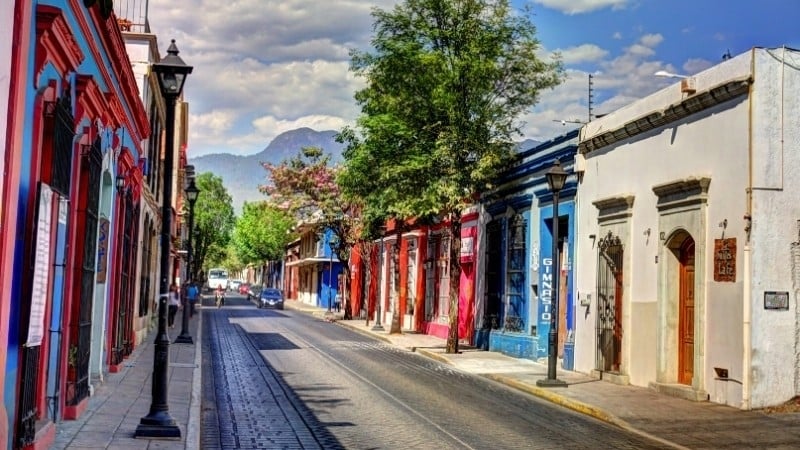
Image credit: mehdi333300 via Canva Pro
27. ¿Dónde está la parada de autobús más cerca?
Planning your itinerary and wondering like, ‘Where is the nearest bus stop?’ from your hotel? This is what you can ask the concierge or even other locals!
Proper pronunciation: Don-deh ehs-stah la pa-ra-dah deh oto-boos mas sehr-kah
28. ¿Dónde está la estación de tren más cerca?
Similar to the previous item, this one translates to, ‘Where is the nearest train station?’
Proper pronunciation: Don-deh ehs-stah la ehs-tah-syohn deh trehn mas sehr-kah
29. Un billete para… , por favor
This is for requesting for a ticket to a certain terminal, station, or stop. For instance — un billete para Barcelona-Sants, por favor means ‘a ticket to Barcelona-Sants, please.’
Proper pronunciation: Oon bee-yeh-teh pah-ra… , por fah-bor
30. Estoy perdido
While we hope that you won’t ever have to use this, sometimes things happen and you get lost while exploring. Fret not, because you can easily say, ‘I’m lost’ in Spanish and proceed to ask for directions.
Proper pronunciation: Ehs-toy pehr-dee-doh

31. Derecho
When asking for directions, you might have to prepare in case locals switch to their own language. That said, let’s start with this one, which means ‘straight ahead’ in Spanish.
Proper pronunciation: Deh-reh-choh
Note: As an adjective (rather than a preposition), derecho can also mean ‘right’ (opposite of left), and ‘correct’ or ‘upright’ in Spanish.
32. A la derecha
Not to be confused with the previous item, this Spanish phrase means ‘to the right.’
Proper pronunciation: Ah lah deh-reh-chah
33. A la izquierda
On the (literal) other side, there’s the Spanish phrase for ‘to the left.’
Proper pronunciation: Ah lah eeth-kyehr-dah (or ees-kyehr-dah)
34. En la esquina
This could also come in handy when giving exact directions to your taxi driver. It translates to ‘at the corner.’
Proper pronunciation: Ehn lah ehs-kee-nah
35. Aquí / Allí
This pair of Spanish phrases mean ‘here’ and ‘there,’ respectively.
Proper pronunciation: Ah-kee / Ah-yee
Also read: 8D7N Itinerary Around Spain: Barcelona, Valencia and Madrid
Basic Spanish phrases for dining

Image credit: Roxiller via Canva Pro
36. ¿Qué me recomiendas?
Not quite sure what to order at a supposedly must-try local restaurant? Feel free to say this to the waiter when you’d like to ask, ‘What do you recommend?’
Proper pronunciation: Keh meh reh-koh-myehn-das
37. ¡Estuvo delicioso!
Enjoyed digging into that yummy dish you chose to order? Go ahead and express your compliments by using the Spanish phrase for “That was delicious!”
Proper pronunciation: Ehs-too-voh deh-lee-thyoh-soh (or deh-lee-syoh-soh)
38. Soy vegetariano/vegetariana
Since many dishes in Spanish cuisine come with meat, it’s best to tell the waiter beforehand, ‘I’m vegetarian.’ Use vegeteriano if you identify as male, and vegetariana if female.
Proper pronunciation: Soy beh-heh-tah-ryah-noh (or beh-heh-tah-ryah-na)
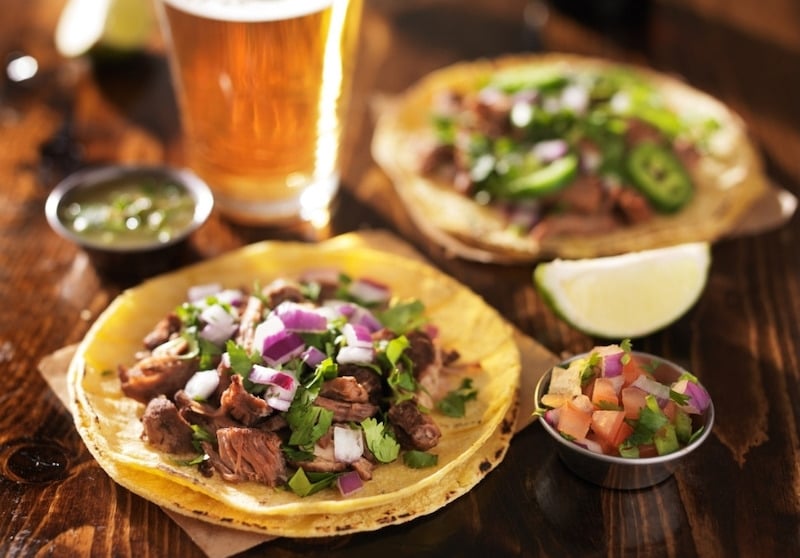
Image credit: Joshua Resnick
39. Soy alérgico/alergica a…
Want to make sure that your order doesn’t contain anything you’re allergic to? Make sure to specify to the waiter, ‘I’m allergic to…’ followed by that certain food or ingredient. And like the previous item, just go with whichever adjective (alérgico vs. alergica) is in line with your gender.
Proper pronunciation: Soy ah-lehr-hee-koh (or ah-lehr-hee-ka) ah
40. Me gustaría un vaso de…
Whether it’s water, wine, or other beverages, this is how you ask, ‘I would like a glass of…?’ And on that note, here’s a quick guide on the translation for common beverages (that normally come in a glass):
- Agua = Water
- Vino tinto = Red wine
- Vino blanco = White wine
- Cerveza = Beer
- Zumo de naranja = Orange juice
- Café helado = Iced coffee
Proper pronunciation: Meh goos-tah-ree-ah oon bah-soh de
41. La cuenta, por favor
And then when you’re finally done eating (or drinking), you can signal to the waiter and say, ‘The check, please’ in Spanish.
Proper pronunciation: Lah kwehn-ta, por fah-bor
Also read: 15 Spanish Foods and Drinks You Must Try Before You Die
Frequently used Spanish lines for shopping

Image credit: ferrantraite via Canva Pro
42. ¿Cuánto cuesta?
Spanish phrases like this are especially useful if you’re the type who would rather look around for the most reasonable price first before buying. Anyway, this line means ‘How much does it cost?’
Proper pronunciation: Kwahn-toh kwehs-ta
43. ¿Cuánto va a ser?
This one roughly translates to, ‘How much is it going to be?’ You can ask this when you’re done shopping and you’re paying for more than one item, so the clerk or cashier would give you the total.
Proper pronunciation: Kwahn-toh bah ah sehr
44. ¿Puedo ver esa?
For travellers who aren’t on the taller spectrum, better take note! This comes in handy when there’s something unfortunately placed beyond your reach. Alternatively, you can also say this to the cashier if you’d like to see an item that’s behind the counter. It simply means, ‘Can I see that one?’
Proper pronunciation: Pweh-doh behr eh-sah
45. ¿Tienes ésta en talla…?
Use this Spanish phrase when asking if they have a clothing item in your size. Unless the store has a numbered sizing chart, here’s a quick guide on the size translation, too:
- Chica = small
- Mediana = Medium
- Grande = Large
- Extra grande = Extra large
For instance, if you tried on a dress and realized that it doesn’t fit quite right, you can say: ¿Tienes ésta en talla grande? — i.e., ‘Do you have this in a large size?’
Proper pronunciation: Tyeh-nehs ehs-tah ehn tah-yah
46. ¿Me la puedo probar?
Unless you’re shopping at a boutique or department store, not every store has a fitting room. So, this line that translates to ‘Can I try it on?’ will be especially useful when shopping in markets. Who knows, they might actually have a makeshift fitting room — you won’t know until you ask!
Proper pronunciation: Meh la pweh-doh proh-bahr
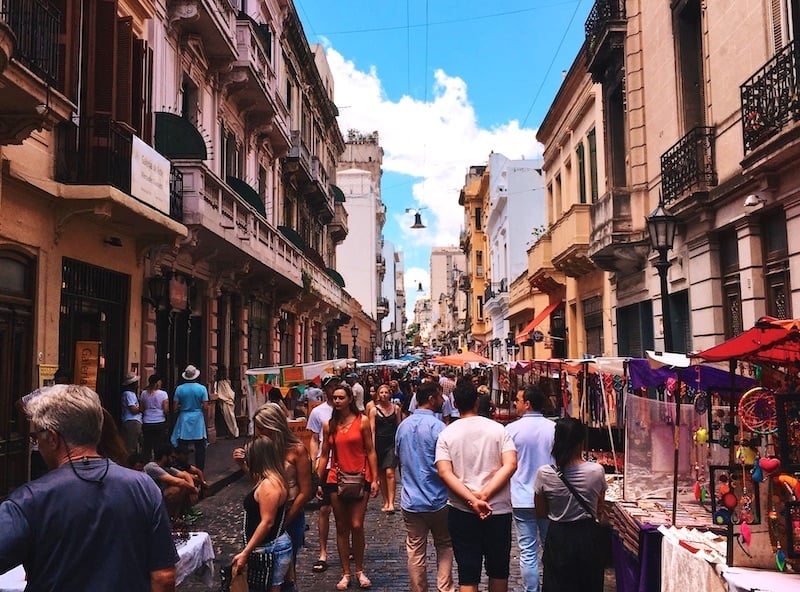
Image credit: Rafael Guimarães
47. ¿La tienes en otro color?
Found something that you like and fits you well, but not really into the colour? Well, it definitely won’t hurt to ask, ‘Do you have it in another colour?’ in Spanish.
Proper pronunciation: La tyeh-nehs ehn ot-roh koh-lohr
48. ¿Aceptan tarjetas de crédito o débito?
In some Spanish-speaking destinations — especially those in more remote areas — there are establishments that don’t accept credit or debit cards. That said, it’s always a good idea to carry cash with you! But just in case, you can at least keep in mind the Spanish phrase for ‘Do you accept credit or debit cards?’
Proper pronunciation: Ah-thehp-tahn (or Ah-sehp-tahn) tar-heh-tahs deh kre-dee-toh o deh-bee-toh
49. ¿Tiene cambio de un billete grande?
Speaking of cash, what about situations where you only have larger bills in your wallet but you’re paying for something quite cheaper? That’s when this line comes in handy, as it translates to, ‘Do you have change for a large bill?’ And in case they say ‘no,’ you can always ask around in nearby stores or restaurants for help with breaking down the bill into smaller amounts.
Proper pronunciation: Tyeh-neh kam-byoh deh oon bee-yeh-teh grahn-deh
50. Me olvidé…
Let’s hope you’ll never have to use this Spanish line, which means you forgot something in particular. For instance, you say ‘Me olvidé pasaporte’ to translate ‘I forgot my passport.’ (Knock on wood, though.)
Proper pronunciation: Meh ol-bee-deh
Summary
Anyway, here’s a quick rundown of the important Spanish phrases you should learn before travelling to any Spanish-speaking country!
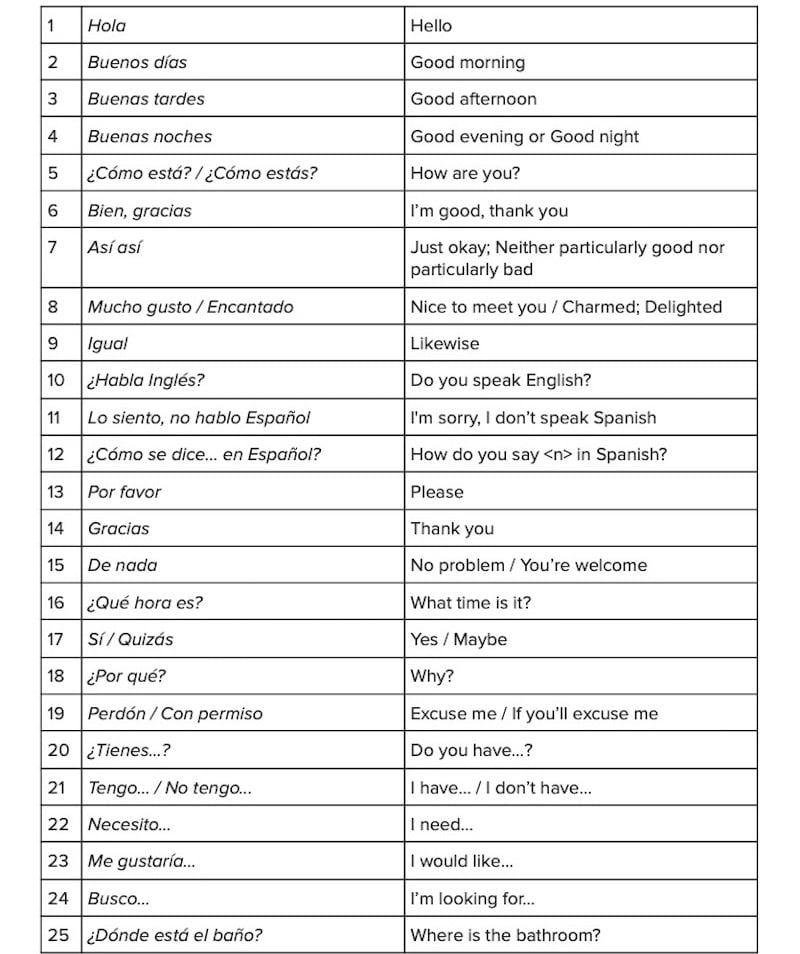
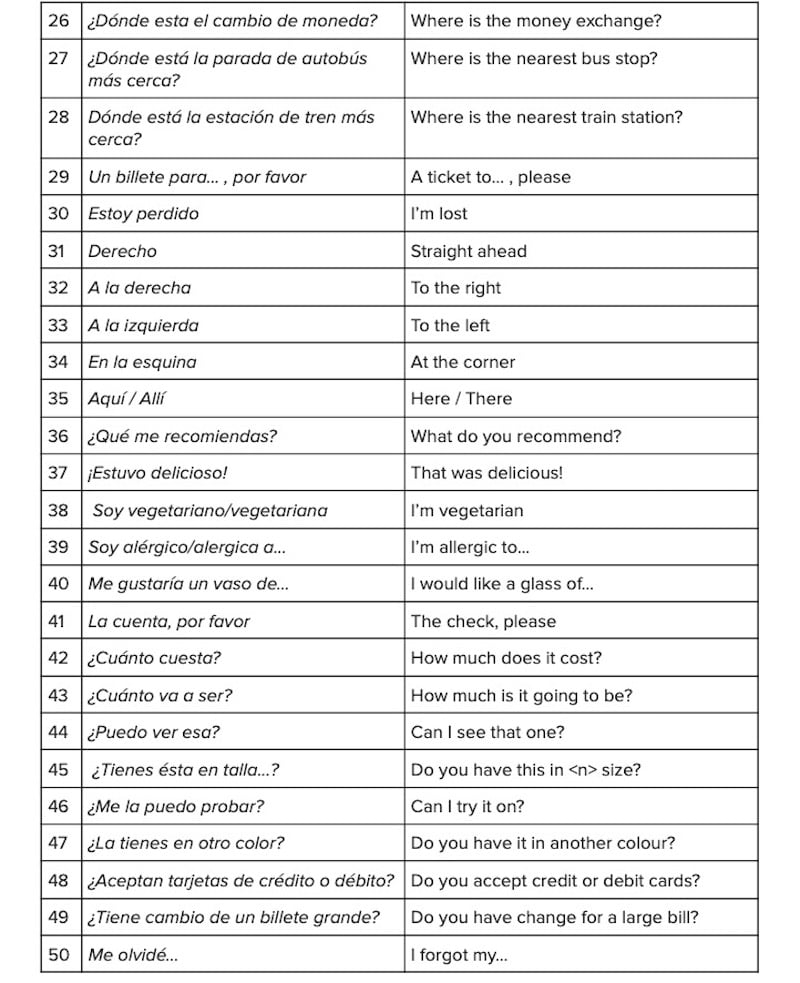
Also read: 7 Tried and Tested Language Apps to Help You in Your Travels!
So, did learning about these basic Spanish phrases get you interested in more foreign languages? Fortunately, we’ve also got you covered with some quick lessons on Korean, Japanese, Mandarin, Thai, Filipino, Singlish, and even British slang!
Featured image credit: Vitaly Edush via Canva Pro
